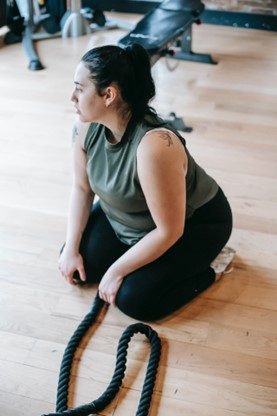
I’ve just finished my standard arm workout. It was more thorough than the arm workouts I did last year, but even though I did more exercises, it felt easier, and it seemed to take less time. Indeed, it probably did take less time than my old workouts.
How can this be?
Did I get stronger? Yes, but as I’ve gotten stronger, I’ve increased the weights and/or increased the repetitions of each exercise, so that doesn’t explain why it’s easier now.
The real answer is that my arm workout has become an automatic routine.
Putting My Exercise on Autopilot: Part 2
Long-time readers might recall my three-day cycle of legs, abs, and arms for strength training. If I do legs on Sunday, then I do abs on Monday, followed by arms on Tuesday. On Wednesday, I’m back to legs as the cycle repeats.
I use this rhythm to set my exercise on autopilot, so I don’t have to choose what kind of exercise to do each day. Recently, I’ve discovered a way to set my exercise on autopilot within those workouts.
These workouts consist of me doing a variety of strength training exercises that I’ve learned over the years. In the past, I would do the exercises in a random order each time. I would have to pause and think about what to do next after each exercise. I might forget or “forget” to do some of the exercises. I would often quit early.
But several months ago, I decided to try an experiment: map out a routine that puts the exercises into a set order. Since then, I’ve been doing all of them in the exact same order each time. And the results surprised me.
The Benefits of a Fully Automatic Routine
Compared to doing my exercises in a random order, doing them in the same order each time has dramatically lowered the willpower required to do the workout. The workouts seem easier and shorter, even though I often do more than I did before establishing the routines. I naturally flow from one exercise to the next, so there’s less downtime. And I almost never feel like quitting early.
The benefits largely come from a reduction of choice. I don’t choose how to begin, I don’t choose what to do next, and I don’t choose when to stop. I just follow the routine to completion.
Much of the struggle with exercise comes from having to make choices. What exercises should I do? How should I do them? In what order? Ugh.

That’s why people hire personal trainers. That’s why my wife prefers exercise classes. Sometimes, it’s nice to have someone tell you what to do. In my case, that someone is just my past self. I mapped out a full routine for each of my three days (legs, abs, and arms) once, and now I never have to think about it again.
Beyond Exercise Routines
The point here is not that you should adopt my particular workout program. The point is that the more clearly defined a routine is, the easier it is to follow. And this doesn’t just apply to exercise.
About seven years ago, I crafted a well-defined morning routine that I’ve had an easy time following ever since. I perform the same self-care activities in the same order each morning, ensuring that I start my day on the right foot without expending any willpower and without having to decide what to do.
You can do the same thing with a bedtime routine, a stretching routine, a start-of-work routine, an after-work routine, or even something as simple as the way you prepare breakfast.
(Sidenote for parents: The more clearly defined and consistent the routines you have for your kids, the less resistance they’ll put up.)
A Clear Path is Easy to Walk
Any routine you have is composed of connections between neurons in your brain. The more often that routine is followed, the stronger those connections get.
Forming a new routine is like bushwhacking your way through a dense forest. It’s difficult to blaze a trail, but once you do, it gets easier. Take the same exact route each time, and it will become such a clear, well-worn pathway that you’ll find yourself walking it automatically, without the need for thought or willpower.

You do this by getting clear on when, where, and how you’ll perform the behaviors and fully committing to the routine.
You Need Automatic Routines
Life is full of difficult choices and challenges that demand careful thinking and self-discipline.
So don’t waste brainpower every day making decisions about the mundane. Organize all of the boring, regular stuff you have to do (or think you should do) into well-defined routines.
That way, you’ll have the energy to give your best to the things that matter most.
Special Announcement!
I just updated my habit coaching offerings to include a middle-length package. It’s 10 sessions over about 4 months for $999. To learn more about habit coaching, click here, or just send me an email to schedule a no-obligation free consultation: chris@becomingbetter.org.
